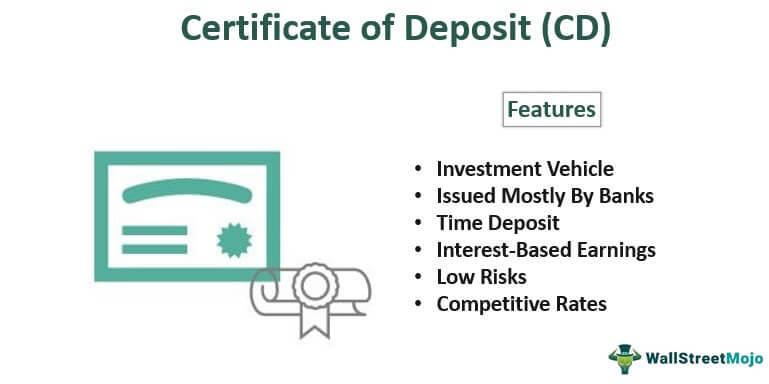See: How Are Yields Taxed on a Certificate of Deposit (CD)?
Aug 30, 2022 By Triston Martin
Introduction
How are yields taxed on a certificate of deposit (CD)? You can earn interest on a lump sum of money for a certain period by placing it in a certificate of deposit (CD). Money invested in a certificate of deposit (CD) must not be handled during the duration of the investment, or else fines and interest will be imposed. To make up for the fact that they are less liquid, savings accounts typically offer lower interest rates than certificates of deposit. Most retail banks offer CDs, but each institution has the freedom to determine its terms, the interest rate for savings and money market products, and early withdrawal costs.
There is a surprising amount of variation in CD rates given by different banks, so it's important to shop around to find the best deal. Long-term certificates of deposit (CDs) at your neighborhood bank might pay nothing more than a pittance, while CDs at an online bank or a credit union might earn you three to five times the national average. Some of the best deals are found in limited-time promotions, which typically have unusual durations like 13 or 21 months instead of the more common periods based on three, six, or 18 months or full years.
CD Yield Tax
Nonetheless, with increased interest comes additional responsibility. Whether or not the return is paid out to the investor (typically, it is deposited into another account or reinvested into the CD), the money is still subject to state and federal taxes. And that sum is taxed as interest income rather than the (often more beneficial) rate applicable to capital characteristics. To illustrate, a shareholder in the 24% tax bracket who makes $300 in CD interest is responsible for $72 in taxes. Yields on certificates of deposit are taxed at ordinary income rates, not the preferential capital gains rates.
The issuing bank or credit union provides a 1099-INT document detailing the previous year's interest earnings to the CD holder. CDs that mature in the same year they were purchased are subject to taxation on all interest earned. Multi-year CDs only incur taxation on the interest earned each year. If a three-year CD pays interest on the last day of the tax year, the account holder will only owe taxes on the interest.

There is no way to avoid paying tax on the interest from a CD, except when the CD is acquired in a tax-advantaged account, such as an IRA or 401(okay). As with an individual retirement account (IRA), the CD, in this case, can let you delay some of your taxes. Until distributions are paid from the account, usually in retirement, when the investor is in a reduced tax bracket, no 1099-INT is sent even though interest is being earned.
On Form 1099-INT, you will report the interest you received and any penalties you incurred for cashing out your CD before it matured. CD holders can reduce their taxable interest income by the amount of any such penalty incurred. Although certificates of deposit (CDs) have a low risk of loss, users should still consider the impact of taxes on the expected total return from the CD.
Are Redeemed CDs Considered Income?
The principal of your CD earns interest until its maturity date, at which point you can withdraw your money. However, only the excess above the initial investment is typically considered income. If you're looking for a safe and secure way to invest $10,000, a one-year CD offering a 1.1 percent annual yield may be an option. When your CD has earned around $110 in interest, it will be considered fully mature. Upon maturity, you will get a total of $10,110 from the issuing bank, consisting of your initial investment and accrued interest. However, only the $110 in interest is taxable and will appear in box 1 of the 1099-INT form you receive from your bank come tax time.
Interest Income
The interest you earn on a CD is considered income by the IRS, whether you take it in cash or put it back into a CD. (The same method applies to interest accrued on a certificate of deposit that allows for withdrawals before maturity.) According to the Internal Revenue Service, the interest is taxable in the year it is received. If you receive more than $10 in interest in a calendar year, the bank or credit union from whom you obtained the CD must provide you with a Form 1099-INT to report the income. In the box below, you can view the specifics of your CD's interest earnings for the calendar year in question.

Conclusion
A certificate of deposit interest is treated as ordinary income for federal and state tax purposes. Certificates of deposit are not considered financing securities. Thus interest earned on them is reported to the IRS on Form 1099-INT as ordinary revenue rather than subject to capital gains taxes like dividends from stocks or bonds.

Triston Martin Oct 13, 2022
Learn how to make money by investing in Stocks
24098

Susan Kelly Jun 09, 2023
Best Online Outlet Stores That Save You Money in 2023
37523

Triston Martin Sep 26, 2022
Ways to Maximize Travel Credit Card Rewards
3432

Triston Martin Sep 01, 2022
Target Prices: The Secret To Successful Investing
23878

Susan Kelly Aug 07, 2022
Homeowners Insurance For Broken Pipes
4964

Triston Martin Apr 02, 2023
IRA withdrawal rules
79222

Susan Kelly Apr 27, 2023
Best Place to Buy Used Furniture Estate Sales
7316

Susan Kelly Apr 28, 2023
How to Find a Financial Advisor if You're Not Rich
47081